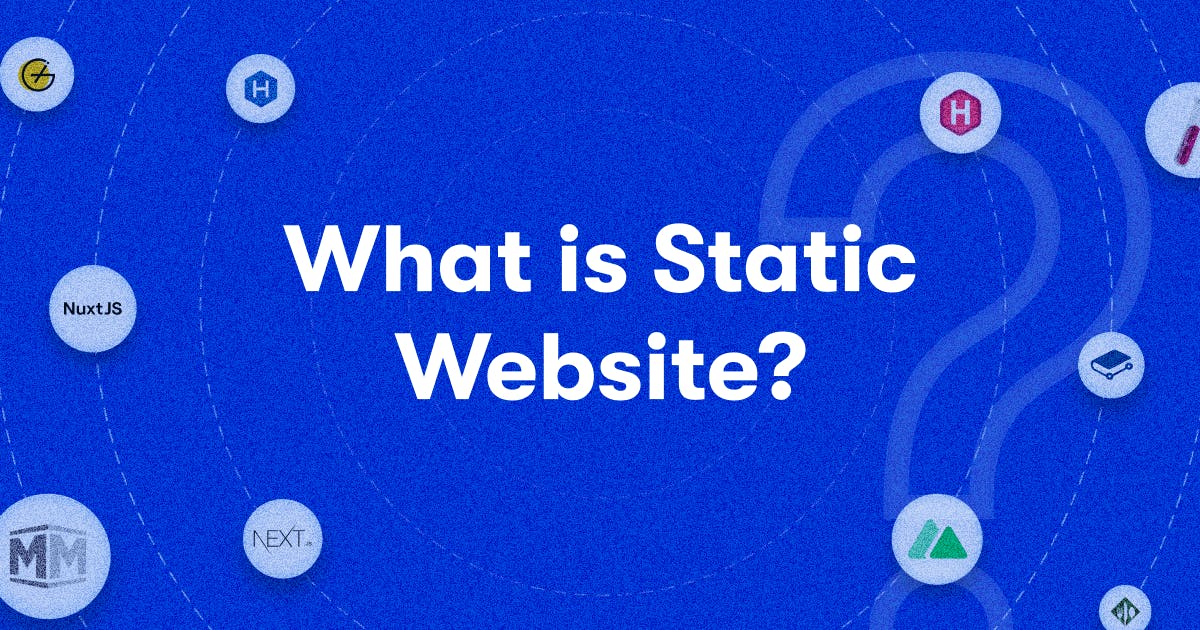November 3, 2021
What is a Static Website?

Abeer H

What a time we are living in! A lot of things are coming back, bringing back nostalgia. Wondering why I am talking about nostalgia and all? Especially when it is supposed to be an article on websites! Well, because some old famous website technology is coming back too. Yes, I am talking about static websites.
Long ago, almost all websites were used to be static sites during the early days of the internet. Then dynamic sites came and blew the space. A lot of websites shifted to it. Obviously dynamic sites have their advantages. But static sites are making a comeback. And it’s coming stronger than before. In this article, you will cover the basics of static websites like what is a static website, what are the advantages, and when you should use a static website. Let’s kick things off.
The Definition: What is a Static Website
The reason it is called a static website is that it shows the same content to all the visitors. Static sites contain fixed contents coded in HTML that are stored on a web server. This is the most basic form of website that uses server-side rendering. That means the website shows exactly what is stored. Unlike dynamic sites where individual users get customized content on their screen.
A static website is basically a set of HTML files, where each file constitutes a single web page. So when you visit a web page, it is actually an HTML file you are viewing, just that, you see a well-designed user interface rather than lines of complex codes. For example, if you visit a website’s home page, it is the “Homepage file” you are browsing through.

What is JAMStack?
Why Choose a Static Website over Dynamic Site
Now the question stands, why you should go for a static website? Especially why should you choose it while dynamic sites offer a lot to offer when it comes to building a website. Yes, dynamic sites are dynamic in many ways. But, there have to be some reasons that the static sites are regaining their popularity in the last few years. Here, we have pointed out some high points why you should choose a static website. Let’s find out why static sites have an edge over dynamic websites.
Performance: Faster Loading Speed
Static websites are way faster than dynamic ones. As they don’t have a back-end system, there is no time loss due to database connection. Instead, the lightweight, pre-rendered HTML files load incredibly fast.
But why fast loading is important? According to Neil Patel, 47% of people on the internet expect a web page to load in less than 2 seconds. While 40% of consumers abandon websites that take longer than 3 seconds to load. Therefore, you have to take serious consideration while choosing your website platform. And there is no better alternative than a static site when it comes to performance. Based on the internet connection and how optimized your site is, you can make it load in no time on the user’s browser.
Less Server-side Dependencies
Dynamic site CMS like WordPress has a greater dependency. They require an operating system like Linux, a web server like Nginx or Apache, PHP with web server configurations and associated extensions, MySQL database, and so on. When you hire a host, you have to depend on the hosting service to update PHP and MySQL more frequently to avoid security vulnerabilities. In contrast, static websites have fewer server-side dependencies. Any web server can host a static site as long as they can return HTML files. So you can now find a hosting that gives you the chance of expansion instead of managing your CMS.
Flexibility: More Freedom to Develop Websites
Unlike dynamic websites, you don’t have to depend on plugins to add functionalities to your static site. Instead, you can create or include features directly into files. Or, you can insert widgets using a snippet.
Besides, building a static site is easier than dynamic ones, so do its maintenance. You can render a static website using several programming languages and frameworks like JavaScript, Ruby, ReactJS, and so on. In short, you have great flexibility to build, maintain, and add features to a static website.
Security: A More Secure Website
Dynamic sites have a lot to depend on the database including security. As the entire system is connected, a breach in the database security can cause fatal consequences. When it comes to a static site, its content database is independent of the front-end web interface. This arrangement leaves less scope for the hackers to enter the system. And makes your website more secure. Also, not having to depend on CMS plugins is another reason that static sites are more secure than dynamic sites.
Scalability: Capability to Handle Massive Traffic
If there’s a sudden hike in user traffic, static websites can accommodate them all smoothly. This is essential when you have a growing business and it is expanding day-to-day. The traffic will be increasing, and your website must have the capability to handle that. As for static websites, they are easily scalable. Just by increasing the bandwidth, static sites can be easily scaled up.
Hosting and Pricing: Saves Your Budget For Good
Hosting service charges according to the space your website acquires on the server. When it comes to static sites, the basic HTML files take little to no space. That cuts down the hosting cost for you. Thereby, you can spend money on quality services like speed, security, and higher bandwidth allocation.
Reliability: Makes Using Website Hassle-Free
Database connection errors are a frequent hassle that happens to websites. You must have seen this message, “Failed to establish a database connection”. This doesn’t happen when you are using a static site. It is obvious, how can a database error occur on a website that doesn’t use a database?
However, the reliability of static sites goes beyond database error. The best thing about serving HTML files is that you can host them anywhere easily like on a CDN. Therefore, in case of an attack on the server, the static website is redirected to another nearest node. That makes static websites more reliable.
Who needs a Static Website?
Yes, a static website may have all its benefits, but is it suitable for you? That’s a big question. It depends on why you are going to build a website, what purpose it will serve. That’s why you must when you should use a static website.
The followings are the common applications where using the static website is the best choice. - Blog sites- - Small business websites - Websites Under-Development - Personal Portfolio sites - Websites that contain basic information
Takeaway
Being a fast loading and more secure website, you can choose a static website for beginner to medium level workload. Hopefully, you have got the answer to what is a static website and why should you use it. Decide carefully does static sites are enough for your need.
If you choose the static website, you can check our article on JAMStack, the static site generator that provides a way to build a perfectly functional website with better performance, higher security, lower cost of scaling, and a better developer experience.

